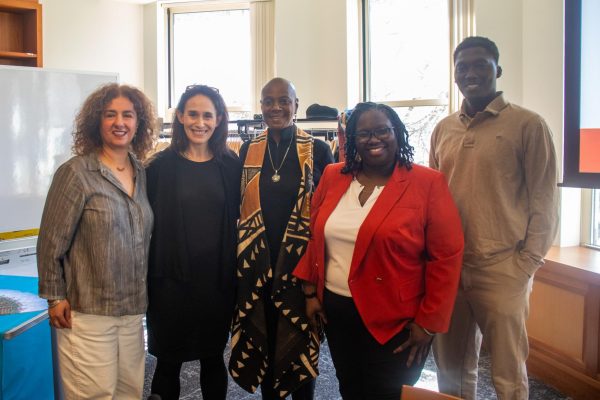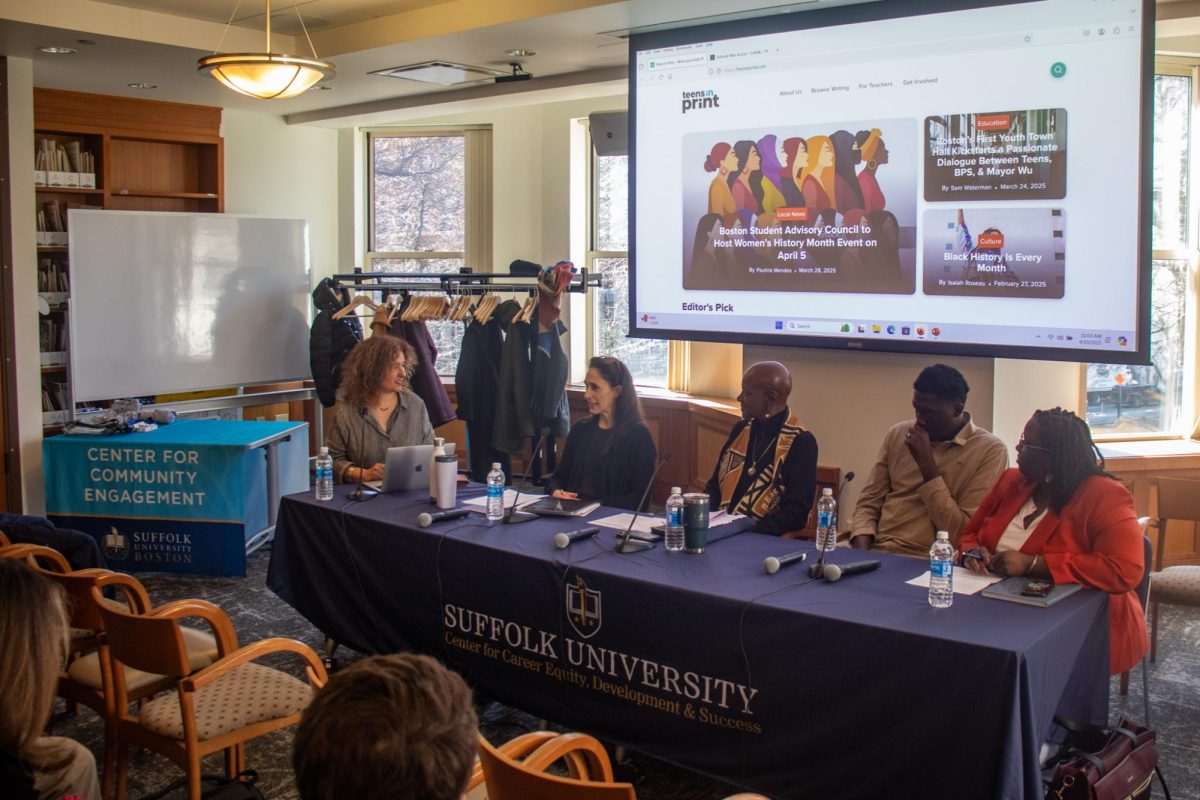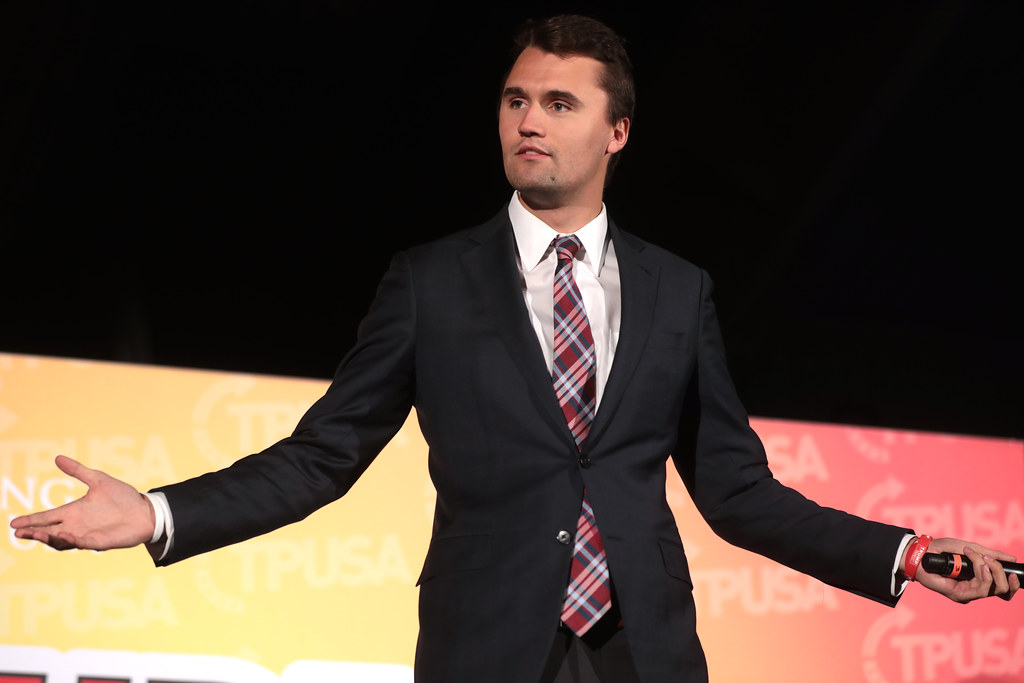Suffolk University community members were invited to engage in a discussion about finding civic engagement opportunities during today’s political climate April 10 with three panelists working to empower people through education.
The panelists were Trina Bryant, director of Suffolk’s Center for Community Engagement; Mohamed Barrie, program director for Teens in Print, a youth writing program in Boston; and Cheryl Clyburn Crawford, executive director of MassVOTE, a statewide nonpartisan civic action organization.
“Empowering Change: Civic Participation and Social Justice in the Current Political Climate” took place in the Poetry Center of the Sawyer Library and was moderated by Professors Shoshana Madmoni-Gerber and Rachael Cobb.
Madmoni-Gerber said that given dramatic shifts in the United States’ political climate following a tumultuous election cycle, the panel’s organizers felt it was necessary to provide an opportunity for students to learn about ways to become engaged members of their community.
“This year, considering the current political crisis, we decided to focus on civic and community engagement and the ways we can encourage our students to become more active and more importantly, to feel empowered to act,” said Madmoni-Gerber.
Each panelist gave an overview of the work their organization does to increase civic engagement, especially among young people.
At Suffolk, the CCE offers numerous opportunities for students to give back to the Greater Boston community and beyond with programs like alternative spring break, service learning and Suffolk Votes. Bryant, who joined the center last year, said that while there are administrators who oversee the center, students are the ones driving the work done to give back to those communities who need it most.
“It cannot be done without student involvement. I think that really helps establish us as a center that is trying to get people involved civically, but also having students take ownership of the things that are important and what we do,” said Bryant.
Teens in Print offers after-school and summer programs for students in eighth through twelfth grade to write stories that are important to them, empowering those young writers to use journalistic tools to their benefit.
Barrie, a freelance reporter and social worker, said the purpose of the program is to give students a platform to express themselves as they begin to form their own ideas about the world, which leads to them becoming more active members of their community.
“Where can you get to use your voice as a catalyst for change? Where do you get to amplify what we believe you already have — you have opinions, you’ve read enough to start forming ideas for yourself,” said Barrie.
MassVOTE has multiple approaches to increasing civic participation, especially among groups that have been historically excluded from the political process. Its Young Civic Leaders program provides high school students the tools to effectively advocate using grassroots organizing methods and gain experience that they can pass on to their peers.

During the moderated discussion, panelists talked about the impact of shifts in federal policy and political challenges present in the current climate. Programs for social change across the country have shuttered or slowed operations since President Donald Trump issued executive orders ending federal support of diversity, equity and inclusion programs.
As a result of federal government funding cuts, many civic engagement organizations face a crisis of where to find support. Nearly 30% of nonprofit organizations receive funding from federal grants, Cobb said, and the work they do could be severely limited by having their financial support taken away.
Bryant said one CCE partner, the Jumpstart program, which has operated out of Suffolk for over 20 years, is uncertain about its future because of the federal funding cuts.
While it can be overwhelming to look at the big picture of social change during times of political turmoil, Bryant said amid difficulties there are also moments to create small, meaningful changes on the local level.
“When there’s a challenge, there’s opportunity,” said Bryant.
Starting small is the best way to get the ball rolling when it comes to civic engagement, Bryant said. The CCE works with students to find what they are most passionate about and give back to their community, which leads to further involvement on a larger scale.
At Teens in Print, Barrie said the mentors teach young writers to redefine what is “newsworthy” and encourage them to cover issues impacting the people around them. By covering the stories that may not have been written about otherwise, Barrie said the writers at Teens in Print show their community the value they have, especially when the world tends to dwell on despair.
“Even when your world feels devastating, there’s so much more happening out there that potentially you can shine a light on by using the skills of journalism,” said Barrie.
Crawford said that everyone has a role in movements for social change. Millions of people across the country feel their voices aren’t being heard by their elected officials, she said, which makes it necessary to re-evaluate the status quo and consider what changes could be made.
“The system that we’re working within, quite frankly, has not really been working for most of us. So I see it as an opportunity for us to rebuild a more perfect union,” said Crawford.




















